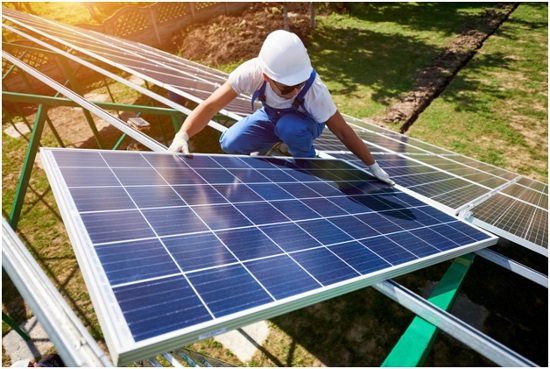As a homeowner, investing in solar power can be a great way to save money and mitigate the impacts of climate change. An investment into clean, renewable energy speaks volumes about your stance on the future of our planet and, as such, may also earn you some “bonus points” with your fellow homeowners.
Yet, as with all new investments, some questions come to mind. How much do solar panels cost? How much money can you save? Does solar help mitigate climate change?


In this article, we’ll review the “nitty gritty” details of how does solar work. Keep on reading to learn more!
What Are Solar Panels and How Does Solar Work?
Solar panels use the photovoltaic effect to turn sunlight into power. They are made up of many solar cells, usually made of silicon, a material called a semiconductor.
When light from the sun hits the solar panels, the light particles, called photons, give their energy to the electrons in the solar cells. This makes it possible for the electrons to break out of their atoms.
The construction of the solar cells is set up so that the free electrons get caught and run in a certain direction, making a direct current (DC) of energy. The DC electricity is then sent through a transformer, which changes it into alternating current (AC) electricity, which can run most electrical devices in homes, companies, and workplaces.
Also, understanding the different types of solar panels is important. It allows individuals and businesses to make informed decisions when considering solar energy as a renewable power source.
Moreover, knowledge of solar panel types facilitates effective maintenance and troubleshooting. Each type has its own unique characteristics, performance factors, and potential issues. Learn more about solar panels and their types here.
Are Solar Panels Right for Your Home?
Deciding whether solar panels are right for your home depends on several factors. Here are some considerations to help you make an informed decision:
Location and Sunlight
How well solar panels work for your home depends on how much sun you get where you live. Solar panels need sunlight to make power, so places that get a lot of sunlight all year are best. Solar panels can be very useful if your home is in an area with long, sunny days and few clouds.
Also, the way your roof is positioned is very important. Most of the time, solar panels can produce the most energy on buildings facing south. Shade from trees, close buildings, or other things can make solar panels less effective, so it’s important to determine how much direct sunlight your land gets.
Energy Needs
To determine if solar panels can meet your power needs, determine how much energy you use. Look at your power bills to find out how much energy you use on average each month.
Solar panels are best for homes that use energy because they can cover much of your power costs. If you have tools that use a lot of energy or an electric car, solar panels can help you save money over time.
Solar panel systems usually last between 25 and 30 years. You should also think about how much energy you will need in the future.
Financial Considerations
When considering solar panels for your home, it’s essential to consider the costs. The installation cost depends on things like the system’s size, the tools’ quality, and how hard it is to set up.
But the price of solar panels has been decreasing over time, making them easier to pay. Look for benefits, like federal or state tax credits, refunds, or handouts, which can cut the costs of getting started by a lot.
Also, consider financial choices like loans or lease plans for solar panels. It’s essential to figure out how much money you could save on your energy bills over the system’s lifetime and how long it will take to get your money back.
Roof Suitability
Whether or not solar panels will work on your roof depends on how it looks and where it faces. Solar panels need a strong, well-maintained roof that can hold their weight. If your roof is old and needs to be fixed or replaced, it’s best to do that before adding solar panels to avoid problems in the future.
The size and shape of your roof also affect how many panels you can put up and how much power the whole system can produce. If your roof is big enough and facing the right way, you can fit more panels on it, which lets you make more power.
What Are the Pros of Solar Panels?
Solar panels, also known as photovoltaic (PV) panels, offer numerous advantages. Here are some of the key pros of using solar panels:
Renewable Energy Source
Solar panels use the sun’s energy, which is a resource that can be used over and over again. Unlike fossil fuels, which can only be used once, solar energy is always made.
Solar panels can turn sunlight into electricity as long as the sun is out. This makes it a reliable and almost limitless source of power. Solar energy’s ability to be used repeatedly makes for a more secure and reliable energy future.
Environmental Friendliness
Solar energy is a clean way to get power that doesn’t pollute the air or release a lot of greenhouse gases. Solar screens don’t release dangerous pollution or add to climate change like coal or natural gas do.
By using solar energy, we can lower our carbon footprint, clean up the air, and keep the earth in good shape for future generations.
Energy Cost Savings
Installing solar panels can lead to substantial savings on electricity bills. While there is an initial investment cost for purchasing and installing solar panels, the energy they generate is essentially free. Once the panels are installed, sunlight is converted into electricity without any ongoing solar costs.
Over time, the energy savings can offset the initial investment, and depending on the size of the system and local policies, you may even be able to sell excess electricity back to the grid, further reducing your energy costs and potentially generating income.
Energy Independence
Solar panels empower individuals, businesses, and communities to generate their own electricity. By reducing dependence on centralized power grids, solar energy offers greater energy independence and resilience. This is particularly valuable in remote areas or during natural disasters, where access to traditional power sources may be limited.
With solar panels, you can generate electricity on-site. This means you can ensure a reliable and uninterrupted power supply.
Long-Term Investment
Solar panels have a long lifespan, typically ranging from 25 to 30 years. This longevity makes them a durable and reliable investment. Although there is an upfront cost associated with installation, solar panels can pay for themselves over time through energy savings.
As electricity prices continue to rise, your solar panels can provide a stable and predictable source of energy, protecting you from future price fluctuations. Additionally, many governments and local authorities offer solar incentives, tax credits, or rebates for installing solar panels, further reducing the initial investment and enhancing the financial returns.
Scalability and Modularity
Solar panels can be installed in various sizes, from small residential setups to large-scale solar farms. They are modular in nature, meaning you can start with a smaller system and expand it over time as your energy needs grow.
This scalability makes solar energy suitable for a wide range of applications, from powering a single household to providing electricity for commercial buildings, industries, and even entire communities. The flexibility of solar panels allows for customization to meet specific energy requirements.
Job Creation
The growing solar industry creates numerous job opportunities across various sectors. From manufacturing and installation to maintenance and research, the solar sector offers employment prospects and economic growth.
As more people and businesses adopt solar energy, there is an increasing demand for skilled professionals, creating a ripple effect that stimulates the job market. Investing in solar panels not only benefits the environment but also contributes to the development of a green economy and the creation of sustainable employment.
How Are Solar Panels Installed?
Solar panels are typically installed on rooftops or in open areas that receive ample sunlight. Here’s a general overview of the process involved in installing solar panels:
Site Assessment
A solar energy professional visits the location to assess its solar potential. Factors such as available sunlight, shading, roof orientation, and structural integrity are evaluated to determine the feasibility and efficiency of installing solar panels.
Design and Planning
Based on the site assessment, the solar installer designs a solar energy system that meets the customer’s needs. The number and placement of panels and the inverter and wiring requirements are planned during this stage.
Permits and Paperwork
The installer helps with obtaining any necessary permits and completing the required paperwork. This may involve submitting applications to the local authorities and the utility company.
Roof Preparation
If solar panels are being installed on a roof, they may need to be prepared beforehand. This can involve removing any obstructions, repairing damages, and ensuring the roof is structurally sound.
Installation of Mounting Hardware
Racking or mounting hardware is securely attached to the roof or ground, depending on the installation type. The mounting hardware provides a stable base for the solar panels.
Wiring and Electrical Work
The solar panels are connected in a series or parallel configuration using appropriate wiring. The wiring is routed from the panels to an inverter, which converts the direct current (DC) electricity generated by the panels into usable alternating current (AC) electricity.
Panel Installation
Solar panels are carefully mounted onto the installed racking or mounting hardware. The panels are aligned and secured in place using bolts or clamps. Proper spacing is maintained between panels to allow for ventilation and optimize performance.
Inverter Installation
The inverter is typically installed near the main electrical panel of the building. It is connected to the solar panels and the electrical grid to enable the transfer of electricity.
How To Look After Your Solar Panels?
Taking proper care of your solar panels can help maximize their performance and longevity. Here are some key tips for looking after your solar panels:
Regular Cleaning
Keep your solar panels clean to ensure they receive maximum sunlight. Dust, dirt, leaves, bird droppings, and other debris can accumulate on the panels and reduce their efficiency.
Clean the panels periodically with water and a soft brush or sponge. Avoid using abrasive materials or harsh chemicals that could damage the panels.
Monitor Performance
Stay vigilant about monitoring the performance of your solar panels. Most solar systems come with monitoring software that allows you to track their energy production.
Regularly check the monitoring system for any significant drops in output, which could indicate a problem with the panels or other components. If you notice any issues, contact a professional for assistance.
Trim Nearby Vegetation
Ensure that there are no overhanging branches or trees that can shade the solar panels. Trim any vegetation that could cast shadows on the panels during peak sunlight hours. This will help maintain optimal sunlight exposure and maximize the energy production of your system.
Prevent Shading
Periodically check for any objects that might cast shadows on the solar panels, such as antennas, satellite dishes, or new constructions nearby. If any shading issues arise, take appropriate steps to mitigate them, such as adjusting the positioning of the panels or removing the shading objects if feasible.
Be Mindful of Roof Maintenance
If your solar panels are installed on the roof, it’s essential to take care of the roof as well. Ensure that the roof is well-maintained, free from leaks, and in good condition. Regularly inspect the area around the panels for any signs of damage or deterioration and address them promptly.
Illuminate Your Home With Solar Panels Today
Solar energy systems are valuable investments for homeowners that can provide long-term benefits, reduce energy costs, and benefit the environment. Working with an experienced professional can help you decide what type of system is best for your home and ensure installation goes smoothly.
Get started now to take advantage of solar energy and explore how does solar work to have a clean and renewable resource.
Did you find the information in this article helpful? If so, be sure to check out our blog for more valuable resources.


























